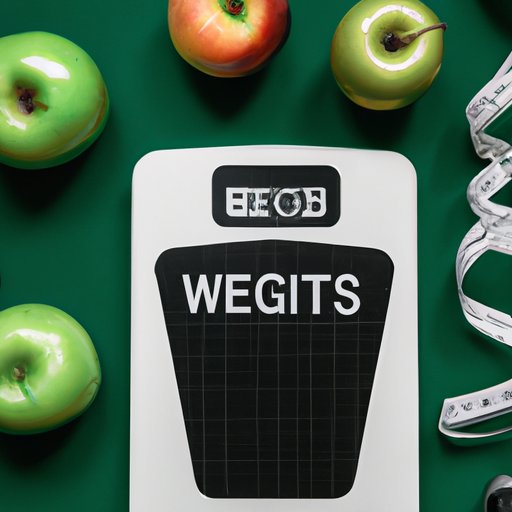
Introduction
Maintaining a healthy weight is essential for overall health and well-being. Unfortunately, many people struggle with weight loss, and there is an abundance of conflicting information available about how to do it effectively. One of the most critical factors affecting weight loss is calorie intake. In this article, we’ll explore how many calories you should eat to lose weight and offer tips for creating a sustainable weight loss plan.
5 Simple Tips for Calculating Your Ideal Calorie Intake for Weight Loss
The first step in achieving your weight loss goals is to calculate your ideal daily calorie intake. A simple formula for determining this number is to multiply your body weight in pounds by 10-12. For example, if you weigh 150lbs, your calorie needs would be between 1500-1800 calories per day. However, several factors can influence this figure, including age, sex, and activity level.
To adjust your diet accordingly, consider the following tips:
– Eat smaller portions: reduce portion sizes gradually and stop eating when you feel satisfied rather than full.
– Add more protein to your meals: protein can help you feel fuller for longer and prevent muscle loss during weight loss.
– Reduce calorie-dense drinks: beverage calories add up quickly, so choose water or unsweetened drinks instead.
– Cut back on added sugars: sugary foods may taste great, but they contribute significantly to calorie intake and can increase cravings.
The Truth About Low-Calorie Diets: Could You Be Eating Too Little?
While a calorie deficit is necessary for weight loss, severely restricting calorie intake can lead to negative consequences. When your body does not receive enough calories to fuel daily activity, metabolism slows down, making it harder to lose weight. Malnutrition is also a risk when consuming too few calories, leading to nutrient deficiencies that can cause health problems over time.
The amount of calories you should consume while trying to lose weight depends on several factors, such as age, sex, and activity level. As a general rule of thumb, adults should not eat fewer than 1200 calories per day. However, individual caloric needs may vary, so consider working with a dietitian or health professional to determine your ideal calorie intake.
Building a Sustainable Diet for Weight Loss: Why Quality Matters More Than Quantity
Focusing solely on calorie intake can be harmful to your health. Instead, prioritize nutrient-dense foods that provide essential vitamins, minerals, and fiber. Vegetables, fruits, whole grains, and lean sources of protein should make up the bulk of your diet. Avoid overly processed and high-fat foods, which are often higher in calories and lower in nutrients.
Consider the following tips to make healthier food choices:
– Eat more vegetables: aim to include a variety of colorful vegetables in your diet each day.
– Choose whole grains: swap refined grains for whole grains, such as brown rice, quinoa, and whole-wheat bread.
– Opt for lean protein sources: chicken, fish, legumes, and tofu are great sources of protein without added saturated fat.
Why Exercise Matters More Than Counting Calories: How to Burn More Fat and Build Lean Muscle
Regular exercise provides numerous benefits for weight loss, including boosting metabolism, burning calories, and preserving lean muscle mass. Strength training and cardio are both essential for weight loss, as they help your body build and maintain muscle while burning excess fat.
To incorporate exercise into your weight loss routine, consider these tips:
– Schedule your workout: make exercise part of your daily routine by setting aside a specific time each day.
– Focus on strength training: building muscle boosts metabolism and helps burn calories throughout the day.
– Mix up cardio and strength training: include a combination of cardiovascular exercise and strength training for optimal results.
The Psychology of Weight Loss: How Your Mindset Can Help (or Hinder) Your Progress
The mental and emotional aspects of weight loss are just as important as diet and exercise. Self-discipline, motivation, and body image issues can all influence weight loss outcomes. Maintaining a positive attitude and mindset can help you stay motivated and on track.
Consider the following strategies for a positive mindset:
– Set realistic goals: avoid aiming for unrealistic weight loss targets and focus on long-term behavior changes.
– Reward yourself: celebrate your progress with non-food rewards that motivate and inspire you to keep going.
– Find social support: seek out a community of like-minded individuals who can offer encouragement and accountability.
Conclusion
In conclusion, weight loss is achievable with a combination of a calorie-controlled diet, regular exercise, and a positive mindset. Focus on nutrient-dense foods, limit calorie-dense drinks, and incorporate strength training and cardio into your routine. Remember that individual caloric needs may vary, so it’s essential to work with a professional to determine your ideal daily calorie intake. And most importantly, aim for a realistic, sustainable plan that prioritizes progress over perfection.




